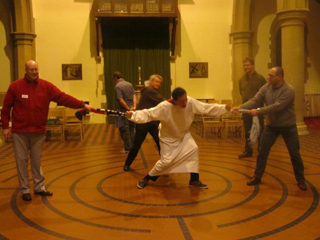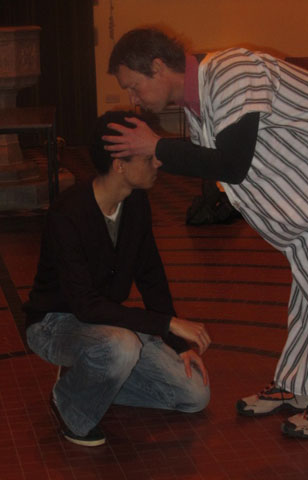I said no at first. Rather, I didn’t say anything, when the casting calls started going out. It sounded like too much hard work. I was in sympathy with the aims; I thought an Abingdon Passion Play would be nice to do. It was going to be performed in the Abbey Gardens, on Palm Sunday, with different locations for different scenes. All very traditional. But …
And then the pleas started getting more impassioned. Simple arithmetic – they just didn’t have enough parts. And it would be a shame for such a noble venture to fail for reasons of apathy, wouldn’t it? There was to be another audition (and another, and another, as it turned out) in early January. So I asked about the time commitment and was told rehearsals would be every Wednesday until Palm Sunday. And it’s a relatively early Easter this year. How hard could it be? We would hit the ground running in 2013, I thought, and off we would go.
Well, we hit the ground all right. The running was the harder bit. Auditions were a case of turn up, and if you’re still interested, come to a rehearsal. The sneaking suspicion started to sink in that we were in the hands of well-meaning but not especially ept amateurs, all pulling in different directions. Like, at one point we were told the next rehearsal would be in two weeks’ time; then we got an email saying the next rehearsal was next week, so we duly turned up. Turned out it wasn’t a rehearsal. When we pointed this out to the producer the week after, we got no sympathy for having foolishly taken an email from a member of the committee at face value. “Did I send the email? No? Well, only believe emails from me.” Not encouraging.
But I stuck with it …
Finally, a script was produced and all interested parties invited to a read-through. The script was slightly longer than the Ring Cycle and with slightly more musical numbers, but it was a start. That was the first really positive development. The next was that even though parts for the read-through were more or less randomly handed out, all present were unanimous that we had our Caiaphas. John C produced a tone of voice that was at once sarcastic, vicious and oleaginous – everything the villainous High Priest should be. I believe he’s a lecturer in real life.
But still it hung in the balance. The original producer dropped out for personal reasons. So did Jesus, and then so did the next Jesus, which in a Passion Play is kind of important. John C asked me if I thought I was “being set up to play the Christos”. Christos, I hope not, I thought.
At the end of January the whole thing hung in the balance for 48 hours or so as the committee deliberated. Should we call it quits? Should we postpone and put it on after Easter – say, Pentecost? Which would be doable, but would raise the obvious question of why, say, we weren’t doing a Pentecost play. Or maybe, with quite a substantial rewrite, we would.
But no. Meanwhile, the new producer asked me if I could do an edit of the script. Finally, something to sink my teeth into, so I waded in. I left the musical numbers in – not my problem – and also a lot of the somewhat specific stage directions, e.g. “Jesus breaks into a sweat”. But I got the Ring Cycle down to about 2 hours; I honed the dialogue so that people spoke to each other more or less colloquially, rather than in slightly out of context Bible quotes; and I gave it some narrative drive so that one scene – and indeed the actions within each scene – should lead logically and naturally into the next. In many ways a Passion Play is like a requiem or a panto – you already know what elements go into it, the enjoyment is in seeing what the performers do with them – but even so it should all make sense as a whole.
(My draft was further polished by other hands, mostly to streamline the opening and closing scenes.)
The temptation to give Pilate an amusing speech impediment was almost overwhelming – but I didn’t, not least because I quite fancied the part for myself. And I took huge delight in taking out Pilate’s final line – “What have I done?” – because there are two lines that just shouldn’t appear in any serious work and that is one of them. (The other is “No-o-o-o-…!”)
And then – oh, frabjous day! – then the new producer brought in the new director, the utterly wonderful and amazing Sam Pullen-Campbell. Sam walked around the proposed performance site, the Abbey Gardens, and saw how it could be done, and said yes, she would do it. That was the day the play took off.
The next rehearsal actually involved auditioning – a producer and director looking at you to see what you could do. (And acting exercises, like: put your two index fingers together, rotate one clockwise and the other anticlockwise. “Droopy but you’ve got the right idea,” she told me. “Probably not the first time you’ve been told that,” whispered the future Simon Peter, displaying a shocking lack of reverence towards his former youth leader.) This was 30th January – a mere, oh, 7.5 weeks before the scheduled performance. Who’s worried?
Sam imported some of the key roles, not least Jesus himself, from her own contacts. The Man was Chris Young, who is 18 and still at school, but can act 30 better than many 30 year olds. He wants to be a professional and I’ve no doubt he will be. I want to get a t-shirt made saying “I knew Chris Young before he was famous.” [Edited to add: young Chris is now officially Kit Young and does indeed already have an impressive career behind and ahead of him.]
And we were away. I wasn’t Pilate, I was the Centurion. Well, he had some good lines too. Out of respect and a sense of humanity for whoever ended up with the part I had already changed the John Wayne favourite “Surely this was the Son of God” line to “He must have been the Son of God,” which is a lot easier to say naturally. Economy of characters meant that he also got the one-liners previously attributed to a couple of walk-on soldier parts, which was even better because it meant I got to channel my inner Michael Caine and tell the High Priest and his entourage that Pilate does not come at the beck and call of a bunch of religious nutters. And I supervised the flogging of Our Lord.
Then came my next unexpected role: soldier coordinator. Soldiers are also quite important to a Passion Play but they were probably the hardest groups to get volunteers for. I mean, for the Apostles all you need is Simon Peter and a cricket team, but the soldiers …
They were gradually pulled in from left, right and centre, and needed someone to work out their deployments throughout the play. And who better than the Centurion? Apart from anything else, oral directions – “stand there!” – could be given, entirely in character. The Abingdon Dojo provided some, others came in bit by bit, one by one; eventually we had a credible squad, including a trained paramedic to take Jesus off the Cross (I know, maybe a bit late for a paramedic but hey …) and a real live Redcap as drummer. Carl S, whose wife said he had never volunteered for anything in 25 years of marriage until this, became the man who flogs Jesus and got so into it that at his first rehearsal I actually had to improvise the command to stop when the lashes got up to 39.
And so the day approached. Rehearsals soon got to be more than every Wednesday – every Monday, Wednesday and Friday by the end of it. I can’t speak for the others, but I was buzzing. I believed in this. I wanted this. Some of the scenes were so astonishing and powerful they brought tears to the eyes, and I don’t mean just because the Temple Guards threw Jesus to the ground wuffly – I mean, roughly – or Carl got a bit too close with the lash. I mean because the words and the story were speaking to us.
St Helen’s and St Michael’s churches lent us their space. Rehearsing in St Michael’s, the highest of the Anglo churches in Abingdon (like, purple clothes over the statues for Lent) meant that when we rehearsed taking Jesus from the Cross and laying him in his mother’s arms, we had a pieta on hand for reference.
The day kept approaching, and we started to look askance at the weather. Palm Sunday 2012 I happen to remember quite clearly, mostly because I spent a lot of it sitting vigil at the bedside of a dying friend in Sobell House. But I also remember being able to sit outside on the terrace and read a book.
Palm Sunday 2013, it soon became clear, was going to be blinkin’ cold, and quite possibly wet …



